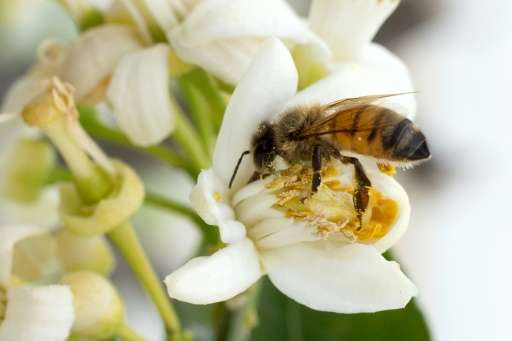French PM says ban on 'bee-killer' pesticide will go ahead

French Prime Minister Edouard Philippe weighed in on a row between his environment and agriculture ministers on Monday to rule that a pesticide found harmful to bees would be banned in 2018 as scheduled.
A ban on neonicotinoids, set down in a 2016 law on protecting biodiversity, has been fiercely opposed by cereal and sugar-beet farmers, who dispute research highlighting the chemicals' risk to bees.
In the first sign of discord in the week-old French government, Agriculture Minister Stephane Travert has been lobbying for the upcoming ban to be eased.
He complained that French law "went further than European law" on the issue, implying that it put French farmers at a disadvantage against competitors.
The European Union set down a temporary ban on the use of three key neonicotinoids in 2013.
Environment Minister Nicolas Hulot, a former activist and high-profile TV presenter, hit back that "where health is at risk, I won't make any concessions."
"We have made too many concessions" in this area, he said. "We will find out about the disaster soon enough."
France's national food safety watchdog, Anses, is due to publish a report on the chemicals' impact on human health by the end of the year.
It was left to Prime Minister Philippe to settle the issue as he released a statement saying: "The government has decided not to roll back the provisions of the 2016 law."
Philippe said the decision had been made on June 21.
Neonicotinoid debate
Farmers' representatives claim there is no cost-effective alternative to neonicotinoids, a pesticide based on the chemical structure of nicotine that targets insects' nervous systems.
Studies have blamed the chemical for harming bee reproduction and foraging by diminishing sperm quality and scrambling memory and navigation functions. It has also been linked to lower disease resistance.
The makers say neonicotinoids are safe if used correctly. They also maintain that evidence linking these chemicals to a plunge in bee populations is flimsy and that the phenomenon is due to a number of factors, such as viruses and parasites.
There are some 20,000 species of bees responsible for fertilising more than 90 percent of the world's 107 major crops.
Under the 2016 French law, which was fiercely debated in parliament, use of neonicotinoids will be banned from September 1 2018, with possible exemptions until July 1 2010.
The exemptions will be permitted on a case-by-case basis, and only when there are no immediate alternatives to a neonicotinoid product.
Travert pushed for the exemption clause to be used generously—"when there is no substitute product, we should be able to authorise exemptions so that our farmers continue to operate successfully."
Macron in February had told the Worldwide Fund for Nature (WWF) that he intended to stand by the ban.
Environment groups said Travert seems to have badly misread the political mood, given expectations that the EU will widen the 2013 ban.
The European Food Safety Authority (EFSA), whose findings underpinned the EU moratorium, is to complete a wider scientific review this year.
Travert, 47, is a former Socialist who became an early supporter in 2014 of Macron's centrist movement.
He was rewarded with the agriculture portfolio, which carries great weight in France, in the post-election ministerial lineup announced on June 21.
© 2017 AFP


















